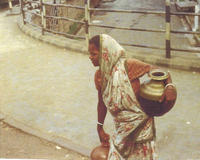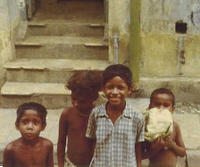
 This morning we awoke very early to take a tour of the city. I am letting my mustache and beard grow, poor though that growth is, because I want to look as grubby as possible to cut down on molestation. I won’t shine my shoes or wash my jeans until I leave India.
This morning we awoke very early to take a tour of the city. I am letting my mustache and beard grow, poor though that growth is, because I want to look as grubby as possible to cut down on molestation. I won’t shine my shoes or wash my jeans until I leave India.Bijou, as expected, has trouble with the heat. I do, too, but my skin, so awful in other respects, protects me with its greasiness.
Bijou: “You look swarthy.” Her kind way of saying “oily and ugly.”
She has a bit of the Trots and a congestive cold so is understandably cranky. As our bus bounced around the sweltering streets, she paled and felt faint a few times. The air does not willingly go into the lungs: you must make a conscious effort to breathe.
Our bus wended through sections of slum shanties, the “Bustees,” registered slums. We saw the old section with its government buildings, also in decay, on narrow streets with iron-railed balconies reminiscent of New Orleans. But the tumultuous life in the streets told a greater truth.
Bijou found a way of dealing with beggars. As we stopped at each temple, young children appeared with big sad eyes and little hands outstretched. I have begun to notice that most seem well-fed though clearly poor beyond western imagination. To one such group, Bijou made her blowfish face by pursing her lips, puffing cheeks and widening her eyes. At once, the surprised grins broke out on their faces and they laughed freely in the way only children can. Soon they were begging, not for “pais” but for more laughs. Time and again the trick made them squeal in glee. They called others who joined in the show. They were children after all.
[On that day we went to the Calcutta Zoo to see the rare white tigers. We stood close to the fence surrounding the enclosure and were watching until I became aware that there was a crowd behind us, watching us rather than the tigers.
That alarmed me because I wondered if we were in a forbidden area or something. Then I noticed that they were looking more at Bijou than me. A small boy near her was standing very close and looking up at her. He looked like he might have Down’s Syndrome or some other condition that gave him a very strange manner. When he stared at her arm, I realized why she had attracted all the attention.
Bijou’s hair was very light reddish brown, her skin very pale with brown freckles. She wore a pink scoop neck short sleeve t-shirt like top. It was not exactly revealing by our standards, but compared to the Indian women there who were very dark and wore saris that covered their bodies completely except for a thin band of skin around the midriff, she must have looked quite exotic to the Indians and much more of a rare attraction than the tigers. 20 June 2002]
Tonight we spoke to Andre Amchin, a French seafood merchant in India to buy shrimp and frog legs. He is a large man, a youthful and manly forty, with a full beard and a twinkle in his eyes when he smiles. He is rakishly cynical about India. They are hopeless; in business lazy, in culture and religion un-Christian and foolish.
“They have a temple for rats!” Arms upraised in Gallic shrug, as if that says it all. In cuisine the worst insult: they are un-French.
His conversation is confrontational: America was foolish to destroy Nixon; Watergate was nothing.
He tells us ---rather, tells Bijou in French, who translates --- that Indian women are lousy lovers. “They lie there like death.” Turkish women are better. But the best, of course, i s his French mistress — in Villeparisis (!)
Dr. David Thomas joined us midway through the conversation.
He is in the final week of a 3 month project with World Health Organization of the UN., advising on smallpox prevention. He had previously spent time in India and two years in Lahore.
He is young, grey, serious faced but friendly and possesses a dry wit. He has firm, sound opinions asserted in a doctorly way but without dogmatic certainty.
I ask him what he thought could possibly be done for Calcutta short of blowing it up and starting from scratch.
He describes the small steps that are being taken: water supply, sewage, housing. But he admits that these things are rudimentary and minimal. The chaos is so large, the impediments so many.
He discourses on "the Asian or Indian mind" which rejects planning.
He relates a story. In a rural village, he found rampant vitamin deficiencies causing illnesses long banished from the west: scurvy, rickets, and the like. He left bottles of vitamins, with instructions on dosages. When he returned a month later, he found the villagers had abandoned the vitamins after one day --- they had not been cured by the first day's dose, so they stopped.
He blames the self-satisfied, obstructive bureaucracy for many of the country's ills. They keep statistics of Smallpox outbreaks, but don't follow up with the required innoculations.
All of India is bad, he says, but Calcutta is, by far, the worst; maybe the worst in the world, perilously brinking on hopelessness.
The conversation between the doctor and the Frenchman is hostile. Andre called David a foolish idealist; David calls the Frenchman "a reactionary."
I mediate but I am not impartial. I am annoyed at the authoritarian certainty of the Frenchman. And, I admit, even more annoyed by his attention and outpouring of charm on Bijou. She is vulnerable to Gallic charm no matter how transparent, anxious to use her own.
But he did give us some restaurants in Paris.

No comments:
Post a Comment